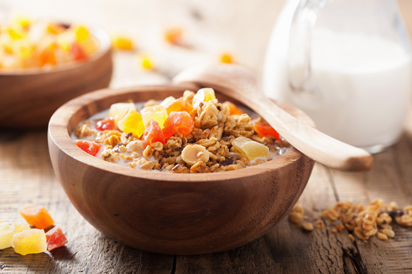
Chew your nuts: Unsalted nuts and seeds are considered healthy snacks as they make you feel full and prevent you from indulging in unhealthy stuff. Try almonds, roasted pumpkin seeds, walnuts, peanuts, cashews, hazelnuts, or filberts. As these have lots of calories, take care to limit quantity intake. Interestingly, one study reported that chewing almonds thoroughly, say 40 chews, promotes feelings of satiety and fullness which are absent if you eat the same quantity but chew less.
Avoid snacks with added sugar: Look for sugar content even when you choose what are deemed healthy snacks, say experts. For instance, some bran muffins and cereal bars are advertised as healthy snacks, but could be loaded with unhealthy fats and added sugar. Always check ‘fat-free foods’ before you go for them as they often contain a lot of added salt and sugar.
Go for veggies and fruits: These natural foods can be great snacks to limit hunger and keep you healthy. Make sure that you eat veggies and fruits that are fresh.
Combo Snack: At each snacking session, go for more than one macronutrient, say protein, fat, and carbohydrate. A balanced snack keeps you feeling satisfied.
Take a break from what you’re doing: Avoid snacking when you are into something else. You tend to eat more if you’re watching TV, browsing or chatting on the phone call. So if hunger strikes, take a break from what you’re doing, have your snacks and then resume your act.
Carry it with you: If you are going out, do some planning and take a pouch of healthy snacks with you. This will help curb temptations when you see mouthwatering but unhealthy snacks.
Repeat breakfast: Foods you had at breakfast could come in useful as a snack. Whether its grapefruit or whole-grain toast topped with jam, this could prove a nutritious snack later in the day.
Snack on cold grapes: Keep your grapes in fridge and make it one of your snacks. As they are cold, you would tend take them very slowly, which increases your level of satiation. Just a handful of calories and lot of sweet satisfaction makes it a good snack.
Wise midnight snack: If your dinner was too light, you will most likely snack at midnight. Specialists suggest you have a carbohydrate-rich snack with a bit of protein. This combination will also increase the tryptophan levels in the brain and help you sleep more soundly. Sleep deprived people tend to eat more calories when they are awake, say experts.
Bigger fork and smaller bowl: One study reported that eating with a bigger fork from a full plate makes you eat less than if you eat with a smaller fork. Similarly, eating from a smaller bowl make you eat less but keeps you satisfied.
Don’t stock junk food: When you are shopping, avoid buying junk food. If you do indulge yourself, keep it out of sight. Have small treats sometimes as this will help keep cravings at bay.
A nutritious diet and healthy snacking habits are important especially for weight loss. Coupled with exercise, smart eating can help you reduce those extra pounds and achieve a healthy weight.